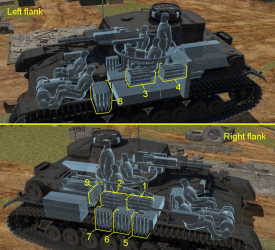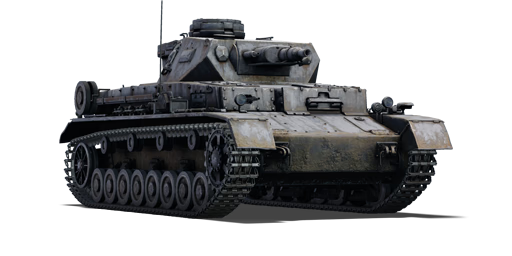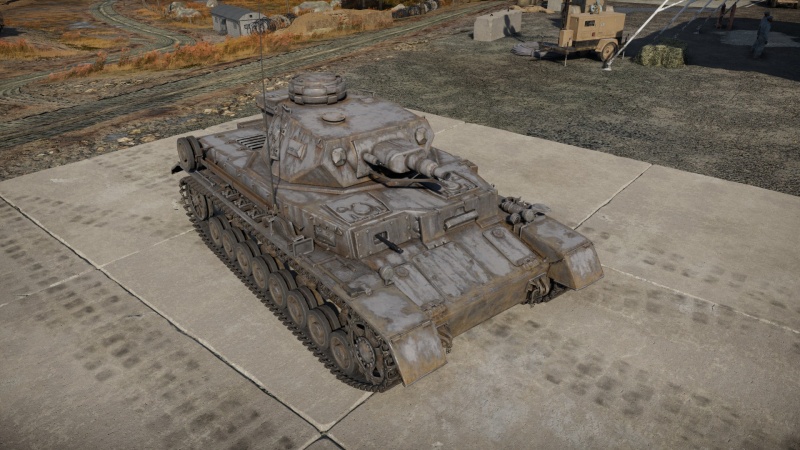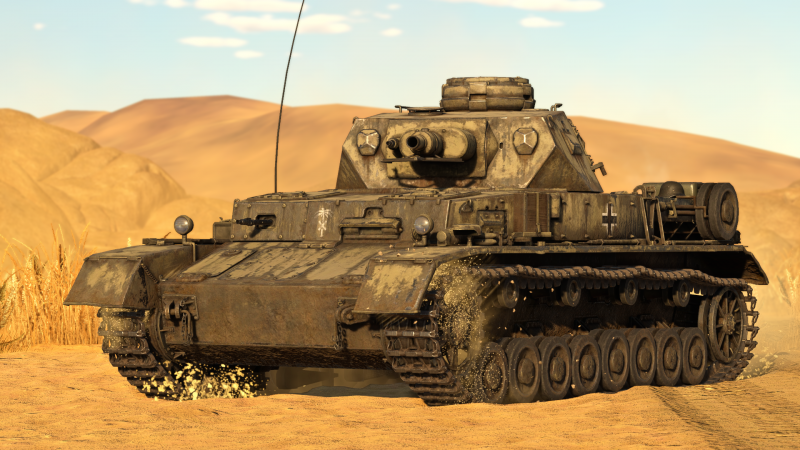Pz.IV E
| This page is about the German medium tank Pz.IV E. For other versions, see Pz.IV (Family). |
Contents
Description
The Panzerkampfwagen IV Ausführung E (Panzer IV E) (Sd.Kfz. Index: Sd.Kfz. 161) is the fifth variant of the Panzerkampfwagen IV medium tank family. Following the victory in Poland, the German Army ordered additional Panzer IV vehicles. This resulted in the Panzer IV E, which was essentially a slightly modified Panzer IV D variant. The structural framework of the Panzer IV E was identical to that of the earlier Panzer IV D. One of the few alterations was the addition of a new driver's visor. Another change was the replacement of the hatch door hinge design, which improved protection. The Panzer IV E's turret design was mostly unchanged from the preceding Panzer IV D variant. The commander's cupola was modified and reinforced. It had five vision ports, each of which was shielded by two sliding armoured coverings. In addition, the command cupola bulge that protruded from the rear armour plate was removed from the rear half of the turret. A fume ventilator and a modification of the signal port's protective cap shape were also added. From March 1941, all Panzer IV E vehicles would be equipped with a storage bin on the rear of the turret. By the end of the production phase in April 1941, approximately 200 complete tanks had been constructed.
Introduced in Update 1.45 "Steel Generals", the Panzer IV E was a continuation of the Panzer IV medium tank family. While the Panzer IV E is capable of fighting more advanced adversaries thanks to increased protection and new HEAT ammunition, it is still largely similar to the previous Panzer IV C, and thus has similar gameplay.
General info
Survivability and armour
In the game, compared to the previous modification Pz.IV C, the E modification is mostly an armour upgrade: the front lower plate is now 50 mm thick, side and rear armour have been increased by 5 mm. Plus, the front and side armour have additional armour plates installed on them. The commander's cupola got thicker as well.
Armour type:
- Rolled homogeneous armour
- Cast homogeneous armour (Cupola)
| Armour | Front | Sides | Rear | Roof |
|---|---|---|---|---|
| Hull | 30 + 30 mm (11°) Front plate 20 mm (72°) Front glacis 50 mm (14°) Bottom glacis |
20 + 20 mm | 20 mm | 10 mm |
| Turret | 30 mm Turret front 35 mm Gun mantlet |
20 mm | 20 mm | 10 mm |
| Armour | Sides | Roof | ||
| Cupola | 30 mm | 10 mm |
Notes:
- Suspension wheels are 15 mm thick while tracks are 20 mm thick.
- Upper front armour (30 mm) is enhanced by added 30 mm plate, making it 60 mm thick total, with small areas with only 30 mm.
- Side armour is also enhanced by added armour plates as well, 40 mm thick total.
- Belly armour is 10 mm thick.
- Hull underside right above tracks is only 10 mm thick.
Mobility
The mobility got improved as well: the top speed has been raised from 35 km/h to 43 km/h. Reverse speed has been slightly raised too (from about 6 to 8 km/h).
| Game Mode | Max Speed (km/h) | Weight (tons) | Engine power (horsepower) | Power-to-weight ratio (hp/ton) | |||
|---|---|---|---|---|---|---|---|
| Forward | Reverse | Stock | Upgraded | Stock | Upgraded | ||
| Arcade | 48 | 9 | 21 | 465 | 572 | 22.14 | 27.24 |
| Realistic | 43 | 8 | 265 | 300 | 12.62 | 14.29 | |
Modifications and economy
Armaments
Main armament
The gun remains the same as the Pz.IV C, a short 7.5 cm KwK 37 L/24 cannon. Notably, a new improved Hl.Gr.38C HEAT shell is available, with higher armour penetration than Hl.Gr 38B.
| 75 mm KwK37 | Turret rotation speed (°/s) | Reloading rate (seconds) | |||||||||||
|---|---|---|---|---|---|---|---|---|---|---|---|---|---|
| Mode | Capacity | Vertical | Horizontal | Stabilizer | Stock | Upgraded | Full | Expert | Aced | Stock | Full | Expert | Aced |
| Arcade | 80 | -10°/+20° | ±180° | N/A | 13.3 | 18.4 | 22.4 | 24.8 | 26.4 | 4.29 | 3.80 | 3.50 | 3.30 |
| Realistic | 8.3 | 9.8 | 11.9 | 13.2 | 14.0 | ||||||||
Ammunition
| Penetration statistics | |||||||
|---|---|---|---|---|---|---|---|
| Ammunition | Type of warhead |
Penetration @ 0° Angle of Attack (mm) | |||||
| 10 m | 100 m | 500 m | 1,000 m | 1,500 m | 2,000 m | ||
| K.Gr.rot Pz. | APCBC | 52 | 51 | 45 | 39 | 34 | 30 |
| Hl.Gr 38B | HEAT | 80 | 80 | 80 | 80 | 80 | 80 |
| Sprgr. 34 | HE | 10 | 10 | 10 | 10 | 10 | 10 |
| Hl.Gr 38C | HEAT | 115 | 115 | 115 | 115 | 115 | 115 |
| Shell details | ||||||||||||
|---|---|---|---|---|---|---|---|---|---|---|---|---|
| Ammunition | Type of warhead |
Velocity (m/s) |
Projectile mass (kg) |
Fuse delay (m) |
Fuse sensitivity (mm) |
Explosive mass (TNT equivalent) (g) |
Ricochet | |||||
| 0% | 50% | 100% | ||||||||||
| K.Gr.rot Pz. | APCBC | 385 | 6.8 | 1.2 | 14 | 102.4 | 48° | 63° | 71° | |||
| Hl.Gr 38B | HEAT | 450 | 4.57 | 0.05 | 0.1 | 872.1 | 62° | 69° | 73° | |||
| Sprgr. 34 | HE | 420 | 5.74 | 0.2 | 0.1 | 686 | 79° | 80° | 81° | |||
| Hl.Gr 38C | HEAT | 450 | 4.8 | 0.05 | 0.1 | 875.5 | 62° | 69° | 73° | |||
| Smoke shell characteristics | ||||||
|---|---|---|---|---|---|---|
| Ammunition | Velocity (m/s) |
Projectile mass (kg) |
Screen radius (m) |
Screen deploy time (s) |
Screen hold time (s) |
Explosive mass (TNT equivalent) (g) |
| K.Gr.Rot Nb. | 423 | 6.2 | 9 | 5 | 20 | 50 |
Ammo racks
| Full ammo |
1st rack empty |
2nd rack empty |
3rd rack empty |
4th rack empty |
5th rack empty |
6th rack empty |
7th rack empty |
8th rack empty |
9th rack empty |
Visual discrepancy |
|---|---|---|---|---|---|---|---|---|---|---|
| 80 | 75 (+5) | 69 (+11) | 60 (+20) | 51 (+29) | 43 (+37) | 35 (+45) | 27 (+53) | 4 (+76) | 1 (+79) | No |

Notes:
- Racks disappear after you've fired all shells in the rack.
- To go into battle with flank racks depleted, pack 27 (+53) shells (racks 1 to 7 emptied).
Machine guns
| 7.92 mm MG34 | ||||
|---|---|---|---|---|
| Mount | Capacity (Belt) | Fire rate | Vertical | Horizontal |
| Coaxial | 2,700 (150) | 900 | N/A | N/A |
Usage in battles
The gun is very powerful with a great rate of fire, and with HEAT shells can one-shot most of its opponents. While being able to penetrate most of your opponent's frontal armour, you are a lot more effective when the enemy doesn't see you as your armour is not the greatest. The Pz.IV E is often capable of annihilating an enemy vehicle with a single AP shell, regardless of the angle of the enemy's armour. It has a fair amount of armour as well, however due to the lack of an actual slope it may seem considerably more fragile than some Soviet vehicles when facing AP shells.
Against most threats, it is often wiser to close in with the enemy vehicle, to make targeting the weakest areas possible, increasing the chance of successful penetration. When engaging vehicles at close range it is, for example, a good idea to count on the slower turret speed of the Soviet machines, allowing the player to circle around them with ease and deliver devastating shots. Bear in mind that while this tank can easily obliterate any vehicle at its own BR, against higher rank enemies the relatively poor penetration of the gun and very slow shell travel speed can become a problem. However, take note that your standard AP round can still penetrate most tanks you face at the battle rating but take HEAT rounds for the more heavily armoured tanks (such as the Valentine and Matilda II). An advisable approach to play the Pz.IV E is to attack the enemy's flanks and avoid direct encounters with enemy vehicles.
Pros and cons
Pros:
- Main armament is destructive, offering various shells for all enemy types: a deadly AP for common targets (e.g. BT-7, M3 Stuarts, etc), two high-penetration HEAT variants for heavy vehicles (e.g. B1) in an uptier, HE for light vehicles (e.g. GAZ trucks) and smoke shell to "blind" the enemies
- Rapid reload of 3-4 seconds means it's easy to deal with multiple targets
- Great gun depression of -10° provides nice mountain warfare capacity
- Adequate speed and cross-country mobility
- Spacious fighting compartment with 5 crew increases survivability, especially when most guns around the battle rating have small calibre and lack damage (e.g. M3 Stuart's 37 mm)
- With the 30 mm add-on armour on the frontal hull, at a distance it is immune to some common opponents' gun like the BT-5/7, M3A3, M5A1, etc
- HEAT can hull break some lightly armoured tanks like the LVT(A)(1)
Cons:
- Thin armour overall plus its large profile, easily gets spotted and penetrated; its turret armour remains unchanged from previous models which is prone to getting penetrated, endangering the gunner
- Gun has low muzzle velocity and huge drop, which makes distant or moving targets fairly hard to shoot at
- Turret turns rather slow at around 10°/s, making it hard to quickly respond to flankers like the BT-7
History
Development
The Pz.Kpfw. IV's creation, like its predecessor the Pz.Kpfw. III, was devised by Heinz Guderian, where he envisioned a support tank to be used to handle anti-tank guns and fortifications. The Panzer IV was to work alongside the more numerable Panzer III in Panzer Divisions (three company of IIIs and one of IVs) to engage the enemy, giving the role of fighting enemy armoured forces to the Panzer IIIs. As a support tank, the tank was to have the short 75 mm Howitzer as its main armament and have a weight limit of 24 tons. MAN, Krupp, and Rheinmetall-Borsig worked on the development of the tanks, but the Krupp's model was selected for further testing.
The chosen model from Krupp once finished used a leaf-spring double-bogie system for its suspension, doing away the proposed interleaved or torsion bar suspension system earlier devised for the sake of faster production. The vehicle held five crew members, the commander, gunner, loader, radio operator (and hull machine gunner), and driver. Though it looked symmetrical, the Panzer IV turret was actually offset to the left of the chassis centre line a bit while the engine was also offset to the right, this was to allow the torque shaft to turn the turret. The offset also meant that most of the ammo is held on the right side of the tank in storage areas. The Panzer IV was then accepted into service and production began in 1936.
Panzer IV Ausf. E
After the Battle of Poland and France, the deficiencies of the Panzer IV Ausf. C saw it being upgraded on October 1940 to the Panzer IV Ausf. E. Still retaining the KwK 37 L/24 75 mm howitzer gun, but with an upgrade to 50 mm thick, with the original 20 mm glacis plus a 30 mm steel plate bolted onto the glacis as improvised protection. The commander cupola was moved slightly forward to accommodate the new storage bin on the back of the turrets from that model on.
Despite that, the Ausf. E was soon taken over by a new variant in production in April 1941, the Panzer IV Ausf. F. Though, the Ausf. E saw service alongside it in Operation Barbarossa, but was soon found to be terribly outgunned by the appearance of the Soviet T-34 and KV-1 tanks. It was replaced from front-line service with the Ausf. F variant.
| Archive of the in-game description | |
|---|---|
|
A modification of the Pz.Kpfw IV medium tank that took into account all the flaws that had previously come to light. The armour plating was enhanced, the front of the body was now covered by additional 30 mm plates, and the sides — by 20 mm plates. The tank now weighed 21 tons. A new model of tracks was also used that had a width of 400 mm rather than the old 360 mm tracks. The tanks of this series were released between September, 1940 and April, 1941. 223 tanks were produced. | |
Media
- Skins
- Sights
See also
Links to the articles on the War Thunder Wiki that you think will be useful for the reader, for example:
- reference to the series of the vehicles;
- links to approximate analogues of other nations and research trees.
External links
Paste links to sources and external resources, such as:
- topic on the official game forum;
- other literature.
| Germany medium tanks | |
|---|---|
| Pz.III | Pz.III B · Pz.III E · Pz.III F · Pz.III J · Pz.III J1 · Pz.III J1 TD · Pz.III L · Pz.III M · Pz.III N |
| Pz.IV | Pz.IV C · Pz.IV E · Pz.IV F1 · Pz.IV F2 · Pz.IV G · Pz.IV H · Pz.IV J · Pz.Bef.Wg.IV J |
| Pz.V | VK 3002 (M) · Panther A · Panther D · Panther F · Panther G · Ersatz M10 · Panther II |
| M48 upgrades | M48A2 G A2 · M48 Super |
| Leopard 1 | Leopard I · Leopard A1A1 · Leopard A1A1 (L/44) · Leopard 1A5 · C2A1 · Turm III |
| Leopard 2 | PT-16/T14 mod. · Leopard 2K · Leopard 2AV |
| Leopard 2A4 · Leopard 2 (PzBtl 123) · Leopard 2A4M · Leopard 2 PL · Leopard 2A5 · Leopard 2 PSO · Leopard 2A6 · Leopard 2A7V | |
| Trophies | ▀M4 748 (a) · ▀T 34 747 (r) |
| Other | Nb.Fz. · KPz-70 |
| USA | mKPz M47 G · M48A2 C |
| USSR | ◊T-72M1 |






